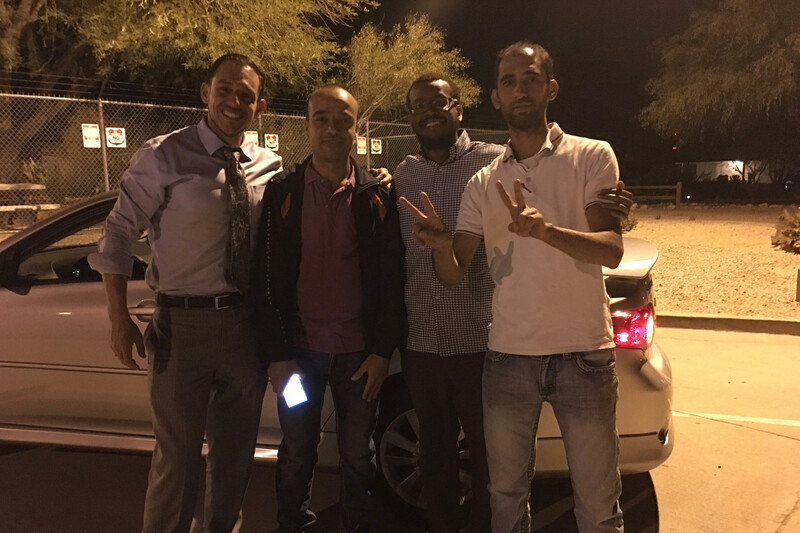Rights and Accountability 28 May 2016

From left to right: attorney Zayed Al-Zayyed, Hisham Ghalia, attorney Liban Yousuf and Mounis Hammouda, pictured just after Ghalia’s release from an ICE detention facility in Florence, Arizona.
More than 19 months after Hisham Shaban Ghalia told an immigration officer that he sought asylum in the United States because it is “a free country,” he has finally been released from an Immigration and Customs Enforcement (ICE) detention facility in Florence, Arizona.
On Thursday evening, ICE officials called his attorneys Liban Yousuf from Arizona’s Council on American-Islamic Relations and Zayed Al-Sayyed and informed them that their client was free to leave.
Yousuf told The Electronic Intifada that before that phone call he didn’t see an end to Ghalia’s detention without protracted litigation with the US government, which had refused to release Ghalia because there was nowhere to deport him.
Ghalia is a Palestinian born in Saudi Arabia but raised in Gaza.
On his ICE documents, Ghalia’s citizenship is listed as “Stateless (Palestine).”
“What made it so difficult was Hisham was calling every day asking for updates and we didn’t have answers for him,” Yousuf said.
“As soon as we got the call from ICE we jumped in the car and went straight to Florence to pick him up,” Yousuf said. “The first thing he did was call his parents in Gaza.”
Ghalia, who will turn 32 this summer, fled Gaza in 2010. He arrived in a refugee camp in Cyprus where he first met Mounis Hammoud, 30, who also fled Gaza after his home was bombed by Israel during its three week assault in late 2008 and early 2009.
Together the two set out to come to the United States by way of an arduous journey through Venezuela, Nicaragua, Honduras, Guatemala and Mexico. The graphic novelist Leila Abdelrazaq told their story in a comic published by The Electronic Intifada in February.
They arrived in the US in November 2014 with a feeling of hope. The FBI determined the men posed no threat and they were placed in a detention center to await their asylum applications.
They did not know they would remain imprisoned indefinitely.
Their cases diverged when Hammouda’s asylum application experienced several setbacks while Ghalia proceeded towards his hearing. With few resources, scant communication with Gaza and no lawyer, Ghalia scrounged together a case for asylum.
In his application, Ghalia cited economic hardship, high unemployment, electricity outages, toxic pollution and hunger as reasons he needed to flee.
Ghalia left Gaza at the height of Israel’s economic blockade, during which Israel’s defense ministry calculated the minimum number of calories an average Palestinian needed to survive to determine how much food they would allow to enter the besieged territory.
Ghalia also cited the constant threat of violence from Hamas and Israel as reasons for fearing return.
On 20 August 2015, his asylum application was rejected on the basis that he did not show sufficient evidence to support his claims.
By that time – nearly a year after entering the US immigration detention center – Shaban would do anything to escape imprisonment.
He told a friend, “They can send me to the moon, I don’t care where they send me. I don’t want to stay in prison.”
Ghalia was being held in almost complete isolation, according to The Nation, which also reported that he was rarely able to contact his family due to the prohibitive rates for calls, and the impossible combination of a nine-hour time difference and power cuts in Gaza.
Those who visited Ghalia and Hammouda in prison noted the men’s agitated and depressed demeanors that they developed over their extensive confinement.
But even after his asylum application was rejected and he signed a waiver relinquishing the possibility of appeal, Ghalia remained in US detention – unlawfully according to Yousuf – for nine more months.
There was no state to which the US could deport Ghalia.
Hammouda was in the meantime released from detention on a $9,000 bond, which the University of Arizona chapter of Students for Justice in Palestine helped fundraise.
In February, CAIR-Arizona and attorney Zayed Al-Sayyed took on Ghalia’s case and filed a habeas corpus petition requesting Ghalia be granted supervised release.
ICE initially refused the petition, stating they were “working with the Government of Palestine.”
The US attorney’s office told Yousuf they needed more time to respond.
Yousuf suspects that ICE’s move to summarily release Ghalia this week was prompted by the US Justice Department, which may have realized they could not justify unconstitutionally holding Ghalia any longer.
Free for now
When Ghalia was released Thursday night he was greeted by his lawyers and sole friend in the United States, Hammouda.
Ghalia is for now making his home in an apartment in Tucson, Arizona, with Hammouda, while they both wait to receive their work permits.
Hammouda, who has been free since 9 March, will have his asylum hearing later this year. CAIR-Arizona and Zayed Al-Sayyed are helping him to present a strong case.
Ghalia no longer has an option to obtain asylum. He is currently out on supervised release, which means he could theoretically be deported if the US finds a country that will accept him.
“He is still ordered to be removed,” Yousuf explained, “but he won’t be detained during that process.”
In the meantime, he will be given a work permit and a Social Security number. He is required to cooperate with ICE officials, check in periodically, and let them know if he moves or leaves the state of Arizona.
In addition to raising the funds for Hammouda’s bail, University of Arizona Students for Justice in Palestine has organized a fundraising drive to support the pair’s living expenses until they begin working.
Six years after the two young men left their homes, families and everyone they knew in Gaza, they may now be able to begin life out of captivity.





